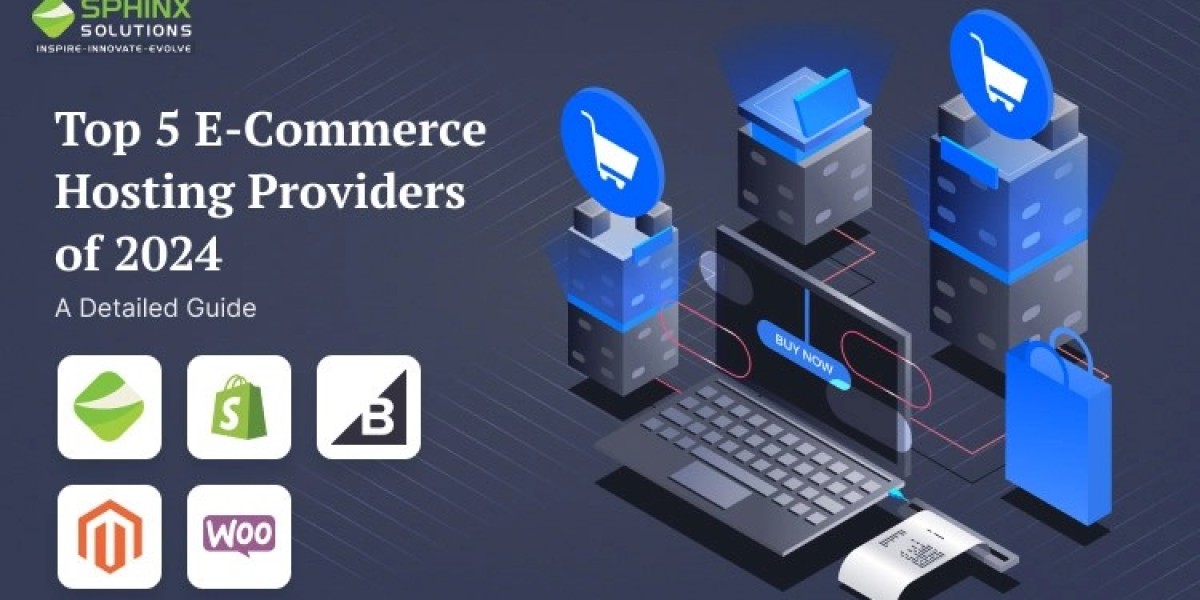In 2024, choosing the right eCommerce development solutions is key to running a successful online store. The hosting environment plays a critical role in influencing your site’s performance, security, and scalability. With numerous options available, selecting the right eCommerce website hosting provider for your business can be both essential and challenging. This guide reviews the top five eCommerce website hosting providers of 2024, offering comprehensive insights to assist you in making a well-informed decision.
For instance, The eCommerce sector is anticipated to hit $5.5 trillion by 2027, commanding 23% of the worldwide retail market. Additionally, the number of online shoppers is forecasted to reach 2.77 billion by 2025. This data underscores the significant growth of eCommerce and its rising prominence in the global retail landscape.
What is an eCommerce Platform?
An e-commerce platform is an integrated software system that enables businesses to build and manage their online stores efficiently. It typically includes features for hosting, processing payments, designing websites, and more, providing a complete package for running an online business.
Platforms like Sphinx Solution, Wix, Squarespace, and Shopify offer comprehensive tools to support various aspects of e-commerce, from site creation to day-to-day operations.
Want to Hire eCommerce Website Hosting Providers?
Discover how Sphinx Solutions’ advanced features and seamless integration can elevate your e-commerce business.
How to Choose the Best eCommerce Website Hosting Providers?
Selecting the best eCommerce website hosting provider involves several key considerations to ensure that your online store operates smoothly and efficiently. Start by assessing your specific needs, such as site performance, security, and scalability.
Look for providers that offer robust support for e-commerce functionalities, including payment processing and inventory management. Evaluate their reliability and uptime guarantees, as well as their ability to handle your expected traffic volume.
Here are the key points that are required before selecting eCommerce service providers:
- Payment processing: Accepting payments online is essential for any e-commerce business. All platforms will offer some sort of payment processing, but check what types of payment they accept. You may need your own payment processor or merchant account.
- Shipping: Shipping is another vital aspect of e-commerce. Make sure the platform you choose offers shipping integrations that fit your business. For example, if you sell large items requiring freight shipping, you’ll need a platform to integrate with freight carriers.
- Inventory management: Keeping track of your inventory is important to ensure you never oversell or run out of stock. Most eCommerce platforms will offer some sort of inventory management, but the level of detail and features will vary from platform to platform.
Read More Related Blogs
Finding Perfect E-commerce Solutions: Pathway to Success
- Customer management: A good e-commerce platform will also offer some sort of customer management. This can include things such as customer accounts, wishlists, order history, and loyalty. This is important to provide a good customer experience and keep track of your customers’ orders.
- Analytics: Analytics are vital to understanding your business and seeing where you can improve. Make sure the platform you choose offers detailed analytics so you can track things such as conversion rate, average order value, customer lifetime value, and more.
- Marketing: Marketing is a great way to drive traffic and sales to your store. Make sure the platform you choose offers marketing features such as coupons, abandoned cart emails, and social media integrations.
- Product management: Managing your products is important to ensure accuracy and keep things organized. Make sure the platform you choose offers features such as product variants, inventory management, product reviews, and more.
- Payment Processing
- Shipping
- Inventory Management
- Customer Management
- Analytics
- Marketing
- Product Management
Looking for The Best eCommerce Website Hosting Services?
Take your e-commerce site to the next level with our powerful tools for payment processing, shipping, and inventory management.
Essential Feature of Selecting eCommerce Hosting Provider
When selecting an eCommerce website hosting provider, evaluate several key aspects to find the best match for your business needs. Consider factors like cost, customer support availability, user reviews, and the ease of use of the software. Additionally, ensure the platform offers the following essential features:
Essential Features
- PCI Compliance: Since 2006, adhering to PCI (Payment Card Industry) standards has been mandatory for handling and storing credit card data. These regulations protect customer information from unauthorized access and fraudulent activities.
- Sufficient Storage: To effectively manage and display your inventory, including images and videos of products, make sure the platform offers ample storage space.
- Backup Capabilities: Despite having robust security measures, problems can still arise. Ensure the platform provides reliable backup options to restore your site quickly if issues occur.
- Reliable Support: Since online transactions can happen around the clock, it’s crucial to have access to support services at all hours. Look for providers that offer comprehensive support through multiple channels such as phone, email, and live chat.
Read More Related Blogs
Unlocking The Potential of Shopify Multi-Currency: A Complete Guide
- User-Friendly Interface: For ease of management, especially if you lack technical expertise, choose a platform with an intuitive, user-friendly interface. Check user reviews to gauge the ease of use and functionality.
- SSL Certificates: Ensure the eCommerce website hosting provider offers SSL (Secure Sockets Layer) certificates to encrypt communications between your website and your customers, which is crucial for safeguarding sensitive information like credit card details.
- Data Center Security: Opt for a hosting service with secure data centers that have advanced physical security measures, such as biometric access controls and surveillance systems.
- PCI Compliance
- Sufficient Storage
- Backup Capabilities
- Reliable Support
- User-Friendly Interface
- SSL Certificates
- Data Center Security
The Top 5 eCommerce Website Hosting Providers of 2024
When choosing an eCommerce website hosting provider, it’s important to consider the top options available in 2024. Each provider offers distinct features and benefits tailored to different business needs. Here’s a look at the top five eCommerce website hosting providers to help you make an informed decision are mentioned below:
1. Sphinx Solution: Leading the Way with Advanced Hosting Technology
Sphinx Solution is at the forefront of eCommerce website hosting, offering a state-of-the-art platform designed to meet the needs of modern online stores. Sphinx Solution distinguishes itself as an excellent option for businesses seeking reliability and scalability, thanks to its emphasis on cutting-edge technology and outstanding performance.
Key Features:
- Advanced Technology Stack: Sphinx Solution utilizes cutting-edge technologies such as AI-driven analytics and machine learning to enhance site performance and user experience.
- Scalability and Performance: Designed to handle high traffic volumes and large-scale operations, ensuring your online store remains fast and responsive even during peak periods.
- Comprehensive Security: Provides robust security features, including advanced encryption, DDoS protection, and regular security updates to safeguard your online store.
Statistics: Sphinx Solution supports a range of high-profile eCommerce businesses, delivering up to 30% faster load times and 25% fewer downtime incidents compared to industry averages.
Example: Notable clients include top brands in fashion and electronics that have seen significant improvements in sales and customer satisfaction.
Read More Related Blogs
Top 13 Best eCommerce Development Companies for Businesses
2. Shopify Hosting: Reliable and Scalable for Growing Stores
Shopify is renowned for its all-in-one eCommerce development platform, and its hosting services are no exception. Shopify Hosting offers a reliable and scalable solution for online stores, ensuring high performance and ease of use.
Key Features:
- Built-In Hosting: Shopify includes hosting with its e-commerce plans, eliminating the need for separate hosting services.
- Automatic Scalability: Handles traffic spikes effortlessly, making it suitable for both small businesses and large enterprises.
3. BigCommerce Hosting: Flexibility and Performance
BigCommerce is another leading e-commerce platform that offers comprehensive hosting services designed for flexibility and high performance. It is ideal for businesses looking for a feature-rich hosting solution with extensive customization options.
Key Features:
- Integrated Hosting: Includes hosting as part of its e-commerce solution, ensuring seamless integration and optimal performance.
- Advanced Security: Features robust security measures, including SSL certificates and regular vulnerability scans.
Read More Related Blogs
How to Find the Best eCommerce Development Companies in India?
4. Magento Commerce Hosting: Power and Customization
Magento Commerce provides a powerful and highly customizable hosting solution, suitable for large enterprises and complex e-commerce needs. Its hosting services are designed to support extensive customization and high-performance requirements.
Key Features:
- Customizable Hosting Environment: Offers tailored hosting solutions that align with your specific business needs and technical requirements.
- Scalability: Designed to handle large volumes of traffic and transactions, making it ideal for high-growth businesses.
5. WooCommerce Hosting: Affordable and Flexible
WooCommerce, a plugin for WordPress, offers a cost-effective hosting solution for small to medium-sized e-commerce businesses. Its hosting services provide flexibility and integration with the WordPress ecosystem.
Key Features:
- Flexible Plans: Offers a range of hosting plans to suit different budgets and requirements, from shared hosting to dedicated servers.
- Extensive Plugin Support: Access to a wide range of plugins and extensions to enhance your e-commerce store’s functionality.
Want to Hire eCommerce Website Hosting Providers?
Discover how Sphinx Solutions’ advanced features and seamless integration can elevate your e-commerce business.
Conclusion
Selecting the best eCommerce website hosting provider in 2024 requires careful consideration of your business’s specific needs and goals. Whether you prioritize advanced technology, scalability, cost-effectiveness, or support, each of the hosting providers discussed offers unique advantages. Evaluate your requirements and choose the solution that aligns with your business objectives.
FAQ’s
1. Which Hosting is best for eCommerce
For eCommerce, the best hosting services are those that offer robust security, scalability, and reliable performance. Providers such as Sphinx Solutions, Shopify, BigCommerce, and WooCommerce on WordPress are popular choices due to their specialized features for online stores. They provide tools for inventory management, payment processing, and customer support.
2. What is an eCommerce Web Hosting Provider?
An eCommerce web hosting provider is a company that offers the infrastructure and services needed to store and manage an online store’s website. This includes features such as server space, domain management, security protocols, and support for shopping cart software. The provider ensures that the website is accessible and operational 24/7.
3. How to Host an eCommerce Site?
To host an eCommerce site, first, choose a hosting provider that supports eCommerce platforms. Next, set up your domain and install the necessary software, such as Shopify or WooCommerce. Finally, configure your store’s settings, upload your product inventory, and ensure payment gateways are operational.
4. How Much Does eCommerce Hosting Cost?
eCommerce hosting costs vary based on the provider and the features offered. Basic plans can start around $10 to $30 per month, while more advanced options with higher performance and additional features can range from $50 to $300 per month. Enterprise-level solutions may cost more, depending on the scale and requirements.
Read More Related Blogs








